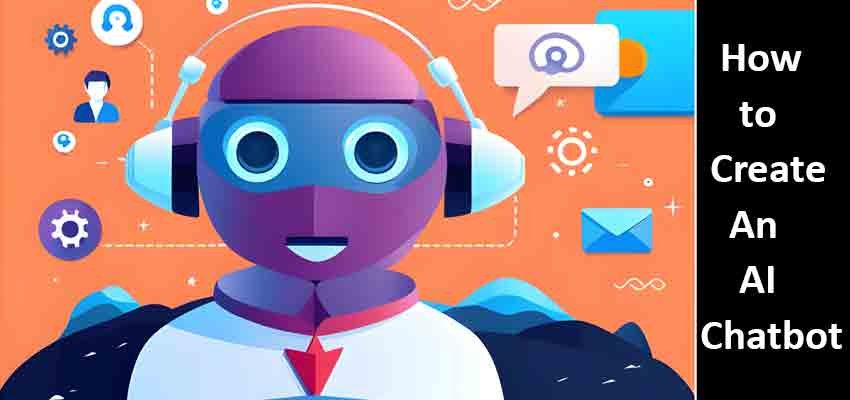How to Create an AI Chatbot, self-design AI Chatbot, make your won AI Chatbot, Chatbot AI generation.
Introduction – Chatbots have become increasingly popular in various industries, providing businesses with an efficient way to engage with customers and users. Creating an AI chatbot involves a combination of natural language processing (NLP), machine learning, and programming skills. In this guide, we will walk you through the step-by-step process of building your own AI chatbot.

1. Defining the Purpose and Scope
The initial step in AI chatbot creation involves defining its purpose and scope. Identify the tasks the chatbot will perform and the specific user interactions it will engage in. This process allows you to customize the chatbot’s functionalities and responses to cater to your target audience’s needs.
2. Choosing the Appropriate Platform
Selecting the right platform or framework is critical for the successful development of your AI chatbot. Various options are available, each with distinct advantages and drawbacks. Popular platforms include:
- Python with libraries like NLTK, TensorFlow, or PyTorch: Offers flexibility and control, making it ideal for more advanced chatbots.
- Dialogflow: Google’s platform for natural language understanding, simplifying chatbot development with pre-built NLP components.
- Microsoft Bot Framework: A comprehensive framework equipped with tools for building intelligent and interactive bots.
- Rasa: An open-source platform enabling the creation of AI chatbots with customizable NLP capabilities.
3. Integrating Natural Language Processing (NLP)

NLP is a fundamental aspect of any AI chatbot. It empowers the chatbot to comprehend and interpret user input. Depending on your chosen platform, integrate NLP libraries or APIs capable of effectively processing and analyzing natural language.
4. Data Collection
To train your chatbot, you need data. Gather conversational data, questions, and answers related to your chatbot’s purpose. You can curate a dataset or collect relevant information from reliable sources. The more diverse and representative the data, the better your chatbot will perform.
5. Data Preprocessing
Before training your chatbot’s machine learning model, you need to preprocess the collected data. This involves tasks like tokenization, removing noise, and converting text data into a suitable format for machine learning algorithms.
6. Train the Model
The core of your AI chatbot lies in its machine-learning model. Depending on the complexity of your chatbot, you may opt for traditional machine learning techniques or advanced deep learning methods. Common choices include:
- Recurrent Neural Networks (RNNs): Suitable for sequential data and handling context in conversations.
- Transformers: Powerful models for natural language understanding and generation tasks.
7. Implement the Chatbot
Integrate the trained model with your chosen platform to create a functional chatbot. If using Dialogflow or Rasa, define intents, entities, and responses to ensure the chatbot understands user queries and responds appropriately.
8. Test and Refine
Thoroughly test your chatbot to identify and fix any issues or errors. Collect feedback from users and use analytics tools to monitor their performance. Continuously refine and update the chatbot to improve its accuracy and user experience.
9. Deploy the Chatbot
Once your AI chatbot is ready, deploy it on the desired platform or website to make it accessible to users. Ensure that the deployment process is smooth and the chatbot is responsive to user queries.
10. Continuous Improvement
An AI chatbot is a dynamic tool that requires continuous improvement. Regularly update your chatbot to keep up with changing user needs and preferences. Utilize user feedback and analytics to identify areas for enhancement and deliver a more satisfying experience.
Conclusion of How to Create an AI Chatbot
Developing an AI chatbot requires meticulous planning, selecting suitable platforms, and skillfully applying NLP and machine learning methods. This comprehensive guide will help you create an intelligent, interactive chatbot capable of effectively engaging users and delivering valuable services across different domains. Always prioritize ethical considerations, safeguard user privacy, and strive for continuous improvement to cater to the ever-changing needs of your audience.
Read Also: Exploring the Best ChatGPT Alternatives









